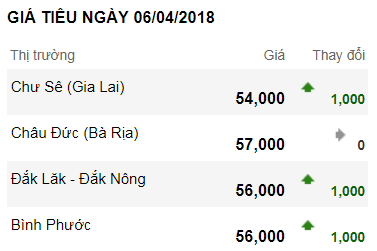On Friday, April 6, pepper price in Ba Ria – Vung Tau market was stable at 57,000 VND/kg, while in other domestic markets, pepper prices simultaneously increased by 1,000 VND to fluctuate in about 54,000 – 56,000 VND/kg of black pepper in a bucket.
Read more: >> Pepper price increased again but still many difficulties
>> World pepper prices are stable, domestic pepper prices are at a record low

Bucket pepper prices in domestic markets on April 6, 2018
Information at the 45th Annual Meeting of the International Pepper Organization (IPC) in Sri Lanka said that the estimated pepper harvest in 2018 was about 570,000 tons, and the seasonal inventory brought about another 100,000 tons. Especially, many countries that are not yet members of IPC, such as China, Cambodia, and Thailand, have rapidly increased output, soon becoming rivals of neighboring countries that are members. However, the most significant is that Brazil’s exports in 2017 will double compared to 2016 and increase even more strongly in 2018, which will be a potential competitor of Vietnam’s pepper industry.
Meanwhile, the Food and Agriculture Organization of the United Nations (FAO) is still very optimistic when it says that, in the long term, the world’s pepper production needs to increase more to meet the demand.
On Thursday, April 5, Indian pepper prices on NCDEX – Kochi, after rising Rs 320 in the previous session, corrected slightly. The contract for April delivery fell Rs 85 to Rs 40,620 a quintal ($6,245 a tonne), while the May contract fell Rs 90 to Rs 40,820 a quintal ($6,276 a tonne). prices remained stable compared to a week earlier.
Spot pepper prices were also stable at Rs 38,600/quintal ($5,935/ton) for bucket pepper and Rs 40,600/quintal ($6,242/ton) for selected pepper. However, the price decreased by approximately 10 USD/ton compared to a week earlier due to the strengthening of the Rupee exchange rate against the USD.
In the international market, the Brazilian pepper price is a direct competitor to the current Vietnamese pepper price reported unchanged because Brazil is also out of stock. It is noteworthy that Brazilians do not intend to store pepper after the harvest because the output of each farmer is not much. Prices of pepper in Indonesia and Malaysia were also stable. On the contrary, the price of Vietnamese black pepper offered for sale decreased by an average of 200 USD/ton compared to the previous week.
While the price of black pepper in the domestic market in Vietnam has increased by an average of 2,000 VND/kg compared to the previous week. But it is still 15,000 VND/kg lower than the price on the first day of 2018.
India’s pepper production this year did not fall as originally estimated…
According to the pepper exporters located in the South, world pepper prices have slightly improved in the short term as the Brazilian supply dries up when the harvest is complete. The Indian crop that is being harvested will not be as expected because the weather in the two main pepper growing states, Karnakata and Kerala, is not favorable. It is expected that the output of the whole India crop this year will decrease about 10,000-15,000 tons to only 60,000 tons compared to the initial estimate. Although Vietnam’s crop output currently dominates the world supply of pepper, the pepper reserves of exporters are also quite abundant, enough to fulfill short-term contracts.
Sharing with agents, domestic companies supplying goods, pepper exporters said that they really want better pepper prices. Due to the stable demand of customers, they often stock a certain amount of goods and therefore, it is not excluded that they have to buy early at high prices at the beginning of the season to deliver at low prices in the middle of the season. Obviously, no exporter wants the market volatility to decrease as recently.
Exporters expect Brazil to harvest this year’s new crop around September, October, and November, certainly price pressure will increase again and will likely be worse than this year. Meanwhile, the increased production supply of Cambodia and Indonesia also contributed to increasing price pressure, it is not known when this fourth downward cycle of pepper prices will end.
English
Follow Young intellectuals/CafeF
Source link
